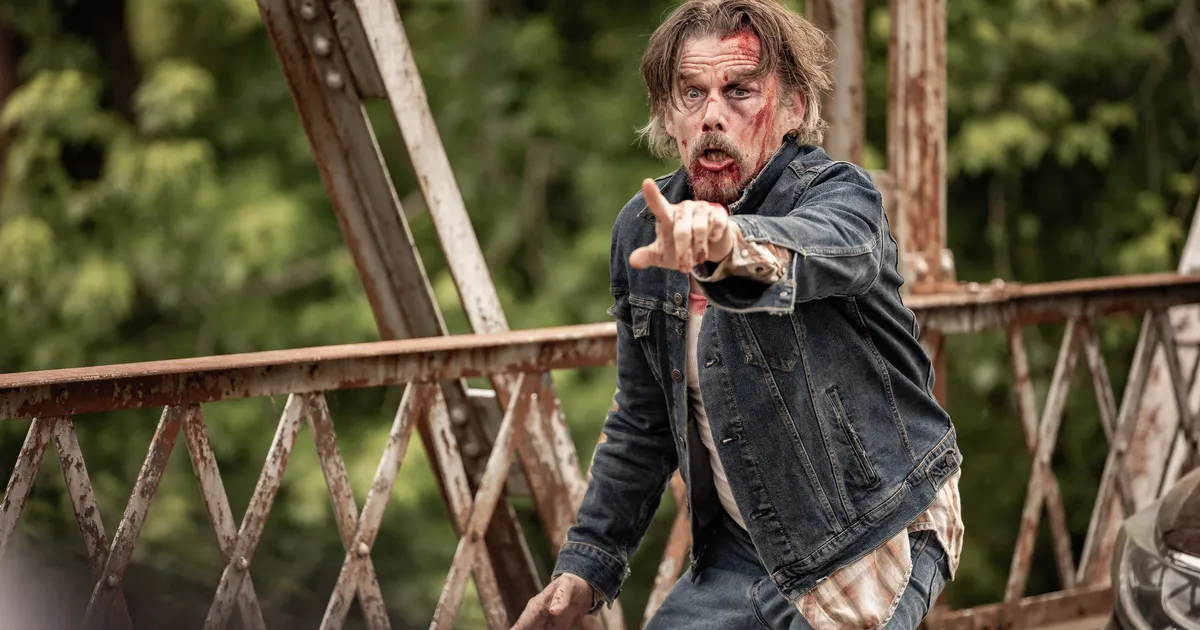
No one can accuse The Lowdown of clearing its throat. Its cold open features a hidden suicide note, a gun that goes off moments after appearing, and some jazzy hat choreo; there’s an abduction, an affair, and a double-murder before the episode is out. Sterlin Harjo’s comic noir is chaotic, but it’s tethered to Tulsa’s sun-baked streets by a stellar Ethan Hawke. Mysteries are unraveled at the pace of the person doing the unraveling, and Hawke’s showy performance as Lee Raybon — a down-on-his-luck writer whose default setting is “go” — makes sense of the show’s urgency. It’s perhaps the most fully realized pilot I’ve seen all year.
We first meet Lee as he steals a Joe Brainard painting from a private members club where the rolls overfloweth with Bible Belt businessmen in Ariat vests in lieu of suits. Just plain ol’ regular folks ruling the world. While Lee’s there, he threatens Frank (Oklahoma’s own Tracy Letts), a developer who’s been gobbling up north Tulsa’s Black-owned businesses, no doubt for nefarious reasons. By day, Lee is a rare and used bookseller, but he moonlights as a civic-minded investigative journalist drawn to stories of crime and corruption. The measure of a day is how many different types of bad guys he can piss off.
Recently, the self-styled “truthstorian” authored an exposé on the elite Washberg family’s racist roots, despite the fact that patriarch Donald Washberg (Kyle MacLachlan) is currently running for the governor’s mansion. Before the episode is over, he’ll take on Tulsa’s sex-trafficking skinheads under the headline, “Aryan Brotherhood Pushing Pills & Pussy???” Lee drives a creepy white van that he keeps in exceedingly dirty condition and eats most meals at an all-night diner or a nearby food truck. Still, even as he’s lying to his ex-wife about the money he owes her for their kid, you never doubt that he’ll magically come up with it.
Because though Lee is lawless and unrefined, he’s good to the bone. When his daughter suggests making life easier by living with her mom full-time, he doesn’t glance at the out. “I bet you anything in the history of daughters and dads that this kind of conversation has happened a lot,” he tells Frances. “I know that not one daughter ever actually wanted their father to say, ‘Okay, cool.’” And when Deidra, the shopgirl that Lee can barely afford to pay, brings her paroled cousin Waylon (Cody Lightning) to the bookstore, Lee can’t help offering him a “security” job to get him back on his feet, knowing that he’ll struggle to afford him, too.
The other distinct source of the series’ appeal is its hyperlocal sense of place. Tulsa is the Big City, and the Oklahoma state line is the limit of the universe. The Lowdown has an actual geography — a world you can walk down. The diner, Sweet Emily’s, is on the same dodgy street as Lee’s store, Hoot Owls Books. He “stashes” the Brainard with Dan, a crude storefront lawyer who works next door. Lee lives above his shop. When we finally see the inside of his apartment — predictably dominated by a murder wall — two neo-Nazis Lee named in a recent article are waiting to give him his first beat-down of the episode. But even as they threaten Frances and her mom, Harjo keeps it light. “We will fuck you where it hurts,” promises one of the skinheads. “Wait, what?” asks his partner in crime.
Black eyes don’t slow Lee Raybon down; black eyes just make Lee Raybon hungrier for the truth. He’s looking rough when he breezes through the front door of the estate sale for the late Dale Washberg (Oklahoma’s own Tim Blake Nelson). We meet Dale briefly in the episode’s cold open. We watch him finish off a note on monogrammed stationery and hide it in an old paperback. We watch him place a gun on his desk. Mercifully, we don’t watch him die; the camera cuts to an exterior shot of the house before the gun goes off. The next time we see Dale, he’ll be a weird epistolary ghost reading his own letter back to Lee.
But, in life, Dale was the private and estranged black-sheep brother to Don, the next governor of the great state of Oklahoma. And Lee is convinced that Dale’s suicide has something to do with the historical takedown he wrote for The Heartland Press. Or was it a murder? A family trust requires unanimous consent from the Washberg kids, and rumor has it that Dale was holding up family business. Lee has no evidence to support his fratricide theory, and yet he makes it, standing in the dead man’s living room, poring over his kitsch. Lee, incidentally, is also there to shop: Dale owned a bookcase full of Okie writer Jim Thompson’s first editions.
Dale’s widow, Betty Jo (Jeanne Tripplehorn), evicts Lee from the sale, though not before he snoops around the office where Dale died. He takes photos of the bloodstain on the windowsill and the daily agenda in which Betty Jo’s closeted husband doodled penises. Lee lingers just long enough to swipe Dale’s note, which was tucked inside a copy of Texas by the Tail. Is the title of the book relevant? The Lowdown is such a complete show that, at this point, it’s impossible to tell the wheat from the chaff. The note mentions that more details about Dale’s death are tucked inside more paperbacks on his shelves, thereby connecting Lee’s twin obsessions — musty old books and the mythic quest to shine light in Tulsa’s dark corners. Later, Ray (Michael Hitchcock) — a gay antiques dealer — will buy the first editions on Lee’s behalf in exchange for a finder’s fee: that Brainard painting he swiped. Everything is relevant.
And just like that, the chase is on. Lee drags Frances to a cattle auction so that he can stalk Betty Jo, who, it turns out, is sleeping with her brother-in-law, the next governor of the great state of Oklahoma. Lee, it seems, has a nose for the truth. It would be an easy trait to admire if it weren’t so inextricably tangled up with a reckless disregard for his own safety. The Lowdown walks a fine if peculiar line. It’s persistently violent, but its violent scenes are filmed in the same comic register; it doesn’t ask the audience to worry about Lee. The first time the skinheads assault him, for example, they trade one-liners. The second time Blackie and Berta pay Lee a visit, they abduct him as Waylon plays video games in the Hoot Owl window. They punch Lee in the face and toss him in the trunk of a car. They drive him, seemingly through the night, all the way to someone they believe will be interested in seeing a bloody Lee in the trunk of a car. It’s Allen, one of the villainous Frank’s associates, who briefly appeared at the private-members-club showdown. (Everything really is relevant.)
Allen is unhappy to see Blackie, a known criminal, soon to be under police suspicion of sex trafficking, thanks to Lee’s journalism, at his place of legitimate business. Allen instructs Blackie to follow him and jumps in his own car. But Blackie never quite lands the plane due to the nature of the cargo he’s transporting. When Allen shoots Blackie and Berta to death and throws their bodies in the Arkansas River, he can’t know that he’s left a witness alive. Allen drives off, leaving Lee to fester in the trunk for who knows how long.
“For who knows how long” turns out to be not long at all. There was a conspicuously eerie scene early in the series premiere between Lee and a mysterious, silky-voiced man, who slides up to our hero at the Sweet Emily’s soda fountain and starts reciting Shelley: “Our sweetest songs are those that tell of the saddest thought.” Marty (Keith David) has read Lee’s investigative stories. “You’re missing something,” he tells him. At first, it seems like the man is talking about the Washbergs, but the conversation bends toward the existential. What brings these lonely souls to a diner in the middle of the hot night? We’re all missing something.
I’d almost forgotten about Marty until he appears in the middle of nowhere to spring Lee from the trunk. He tells Lee that he’s been following him, and Lee, justifiably given his last few hours, doesn’t stick around to hear more. He jumps in the driver’s side of Blackie’s car and speeds off. When he pulls down the sun visor, the money that he owes his ex-wife magically falls in his lap. Lee calls her and they make plans to meet in 40 minutes at a park nearby. He’s driving a dead man’s car. He’s covered in his own blood. He’s about to pay the child support he owes in Nazi dollars. He hasn’t slept or eaten, and still I’m not worried about him. Some men can survive on black coffee and good luck alone. What’s Lee missing? The part that’s meant to tell him when to stop.



